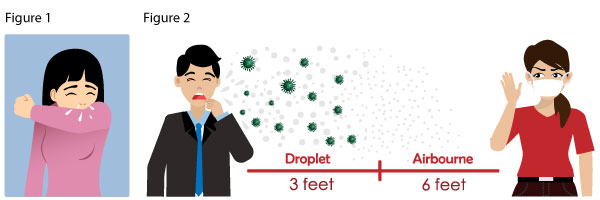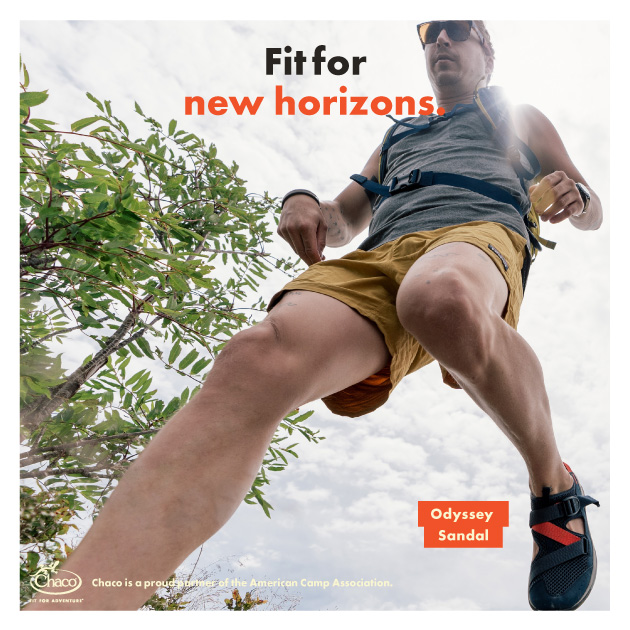In addition to the current COVID-19 pandemic, you may also recall norovirus and SARS (also a coronavirus) outbreaks, Ebola, or even 2009's H1N1 "Swine Flu." There are lots of communicable diseases out there — and they won't go away. Indeed, the threat of communicable disease will remain as long as humans are social beings.
By now, we should all be aware that taking reasonable precautions to limit the potential that we, our campers, and staff will encounter one of these misery microbes is important. While some of the following protective strategies may be second nature by now, the list bears repeating. Each safety practice must be implemented to be effective.
1. Be Protective of Your Airspace
Bury your cough/sneeze in your sleeve (see Figure 1). That keeps germs around you and helps protect others from what you have. When we cough/sneeze, our droplets travel about the length of our arm's reach (see Figure 2). So along with burying your cough/sneeze, be very aware of people who are coughing/sneezing around you, especially if the person is standing within arm's reach. Might you be inhaling their droplets? Many communicable illnesses in addition to COVID-19 — including things like the common cold, chicken pox, and the flu — are spread via droplets.

2. Make Cautious Friends with Your Hands
Wash them often and pay special attention to places that microbes lurk, such as between fingers, the backs of your hands, beneath fingernails, and under rings. But also keep your hands away from your face! Most people get the "wash your hands" message but then mess up by putting their hands in or near their eyes, mouths, and noses. Germs on hands don't do much (unless you have an open wound on your hand) — but those germs love it when we shove them into our bodies while eating, rub them into our itchy eyes, or provide easy access to our noses or mouths by propping up our heads with our hands.
3. Reinforce "Good" Behavior
Got kids around you? They can be walking petri dishes. Teach them protective behaviors and watch to be sure they're practicing them. Reinforce their behavior by catching them "doing it right." One camp appointed a different Mystery Counselor each day who distributed gift certificates for a treat of choice from the camp store when they caught a camper "doing it right."
4. Get a Yearly Flu Shot
Getting a yearly flu shot as well as keeping up to date on your other immunizations will help you and those around you. Be sure parents are aware of your camp's immunization policy, and ask your nurse to figure out the percentage of campers and staff who are fully immunized. This is your "herd immunity." That information is especially important to parents whose prospective camper may be immunocompromised. Then appropriately screen incoming campers and staff. Remember, however, that screening isn't diagnostic. It can miss people in the precursory phase of their illness.
5. If You Get Ill, Stay Away from Others and Vice Versa
Don't think you're being valiant and come to work/camp anyway. As COVID-19 has reiterated, a sick person can spread illness to others too easily.
Likewise, many of us provide care to others. Don't hover over sick family members or campers. Turn the head of a nestling, ill child away from your face. Give them their own tube of toothpaste. Wipe down common surfaces at least daily with a simple bleach solution (one tablespoon bleach in three quarts of water) or disinfectant wipe. Wash your hands after helping the ill person. Provide that care with care!
6. Keep Your Resistance Robust
Get adequate sleep supported by good nutrition and adequate fluids, and monitor your stress. Stressors — both good and bad stress — can sap energy reserves. While a certain amount of stress can give us the kick in the seat that's needed to prod action, constant or overwhelming stress will diminish one's resistance. Taking walks or getting to bed earlier may help manage stress. The best interventions are often simple things.
7. Keep Personal Items Personal
They're called "personal items" for a reason. Make sure you're the only one using your toothbrush, hairbrush, razor, etc. No sharing, even to be nice.
8. Use Tissues Appropriately
Tissues are single-use items. They are permeable; germs can blow through or past them. They can tear too. Don't use one and then tuck it in your pocket for next time. Put used tissues in the wastebasket and then effectively and immediately wash your hands. This is really important when you find yourself picking up someone else's used tissue.
9. Be Aware of Those around You
Personal surveillance goes a long way as a protective measure. Change seats if the person next to you is coughing/sneezing into the air. Wipe down commonly touched surfaces like phones, coffee pot handles, doorknobs, and drinking water spigots. Keep hand soap dispensers filled.
10. Couple Personal Surveillance with a Reliable Source of Information
When a communicable illness surfaces — and it will — knowing what you're coping with enables you to use appropriate strategies for effective intervention. One of the best resources is the current edition of Control of Communicable Diseases Manual (2015). Edited by D.L. Heyman, the book covers big things like Ebola but also the illnesses more typically experienced at camp (e.g., conjunctivitis, athlete's foot, strep throat, Norwalk virus, chicken pox). Another excellent resource is the CDC's searchable website (CDC.gov). It includes downloadable PDFs, background information, photos of various conditions, and updated statistics.
Additional Resources
- Interested in deeper information about communicable disease management for your camp? Access a white paper on this topic.
- Camp Nurses: Read the Association of Camp Nursing's Communicable Disease Practice Guidelines.
- Interested in Online Learning? Explore ACA's webinars. You'll find gems such as Ticks, Tears & Toothpaste: A Counselor's Role in Healthcare and Staff Training Activities to Promote Camp Health & Safety.
- Want a fun way to teach cough etiquette? Watch Why Don't We Do It in Our Sleeves? on YouTube.
Linda Ebner Erceg's (RN, MS, PHN) many years of year-round work as a camp professional, leadership in the Association of Camp Nursing, and participation in ACA initiatives contribute to her Camping Magazine content. She facilitates the Healthy Camps Committee, a collaboration between ACA and ACN, while also enjoying a robust speaking and consulting career from her Bemidji, Minnesota, home base. These activities help make her personal motto, "Healthier Camping for All," a growing reality. Contact Linda via email at [email protected].

